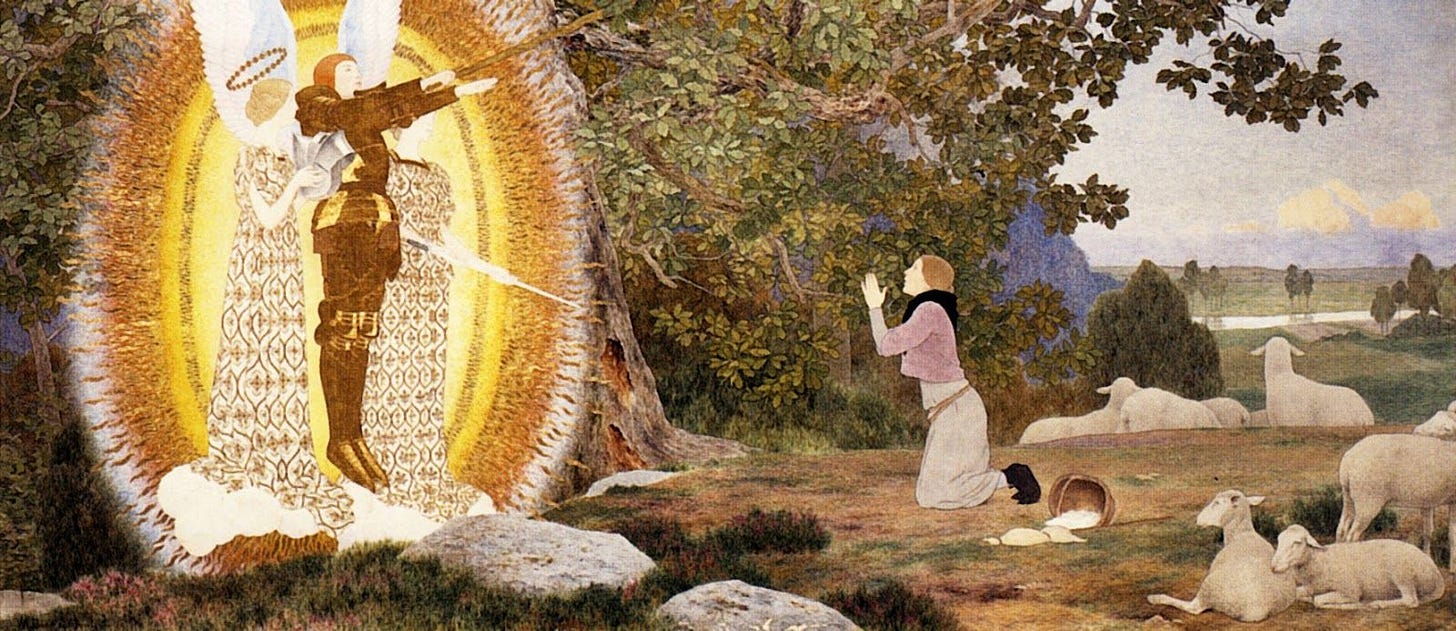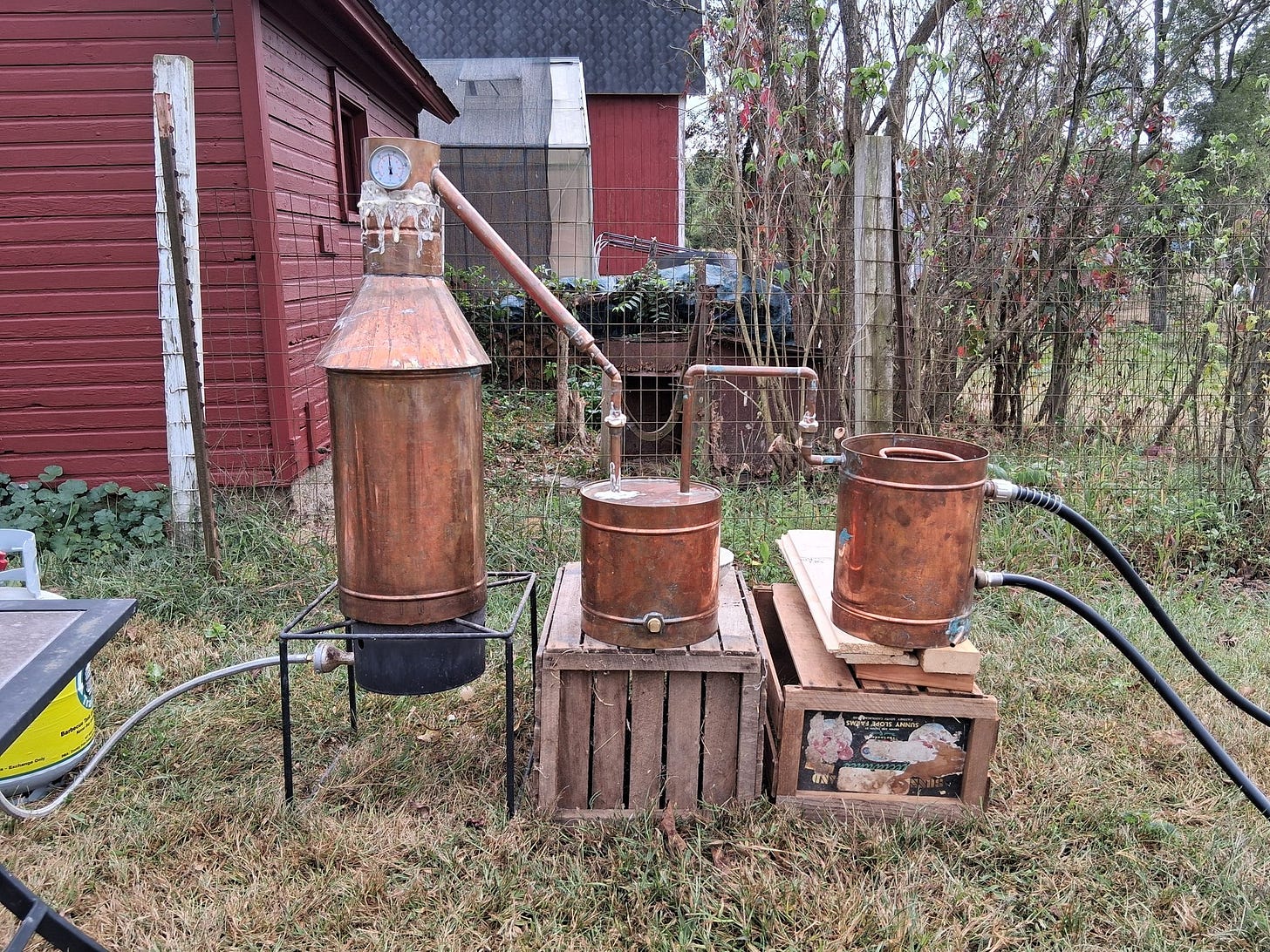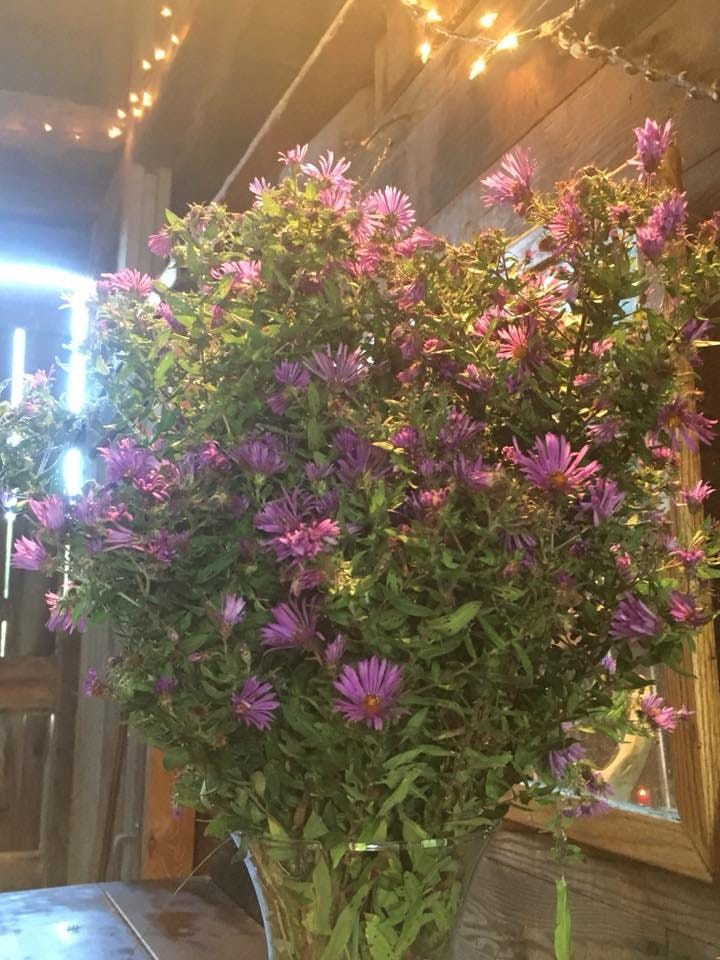I will be speaking at the Southeastuary gathering, October 17-18 in North Carolina. You can find out about it here.
Michaelmas is not a feast generally celebrated in the New World, even in Catholic subcultures, at least in North America. Though I attended Catholic schools, I never witnessed celebration of the feast until I became a Waldorf teacher. It was a beautiful thing—almost two hundred children, arranged according to grade beneath a “dragon skin” (a decorated bedsheet) parading through the schoolgrounds and part of the neighborhood and led by the eldest child in the school wearing the head of the dragon, the trees bright with shades of red, yellow, and orange, and the wind crisp and clear. The parade ended before St. Michael, usually some man from the community unknown to the students, who transformed the dragon back into children. The rest of the day would be spent in games, cider, and the eating of apples.
When I left Waldorf teaching in 2007, I still had young children living at home. And I wasn’t about to deprive them of Michaelmas. So we started to celebrate it on our farm. Here’s an image from a few years ago:
After the parade, our Michaelmas becomes a harvest festival, which it has ever been here in the Northern Hemisphere. As an old Anglo-Saxon homily describes it, it is a feast of “the holy archangel St Michael, the prosperous sower of Christ’s fields and the reaper bearing fruit of the bright lands, who fills the Lord’s barns with the purest wheat.”[1] (As a matter of fact, I just yesterday traded 300 lbs of wheat to a sister farm nearby for a few beehives—a fitting exchange for the feast, methinks).
One of my favorite songs for this time of year is the classic English folksong “John Barleycorn Must Die,” a Frazerian romp if ever there was one that celebrates the birth, death, resurrection, and transfiguration of “poor John Barleycorn” as he passes through seed, burial, sprouting, growth, harvest—and distillation, where he is literally turned into a “spirit.” His transfiguration chamber would look something like this:
Another great harvest activity.
According to my beloved copy of British Popular Customs, Present and Past (1876) by T. F. Thistelton-Dyer, venerable Michaelmas customs of the British Isles included the baking of a Michaelmas cake and decorating the houses with autumn flowers (Michaelmas daisies—purple asters—no doubt among them) and perhaps partaking of the Michaelmas goose. He also reports this lovely custom:
At this season village maidens, in the west of England, go up and down the hedges gathering crab-apples, which they carry home, putting them into a loft, and forming with them the initials of their supposed suitors’ names. The initials which are found, on examination, to be most perfect on Old Michaelmas Day are considered to represent the strongest attachments and best choice of husbands.”
Whatever it takes. The world must be peopled.
St. Michael was enormously popular in the British Isles in the early days of Christianity, as is well-documented in the Carmina Gadelica, Alexander Carmichael’s collection of hymns and incantations he collected from the Gaelic peasantry at the turn of the nineteenth and twentieth centuries. In fact, the number of prayers to St. Michael rival those to Christ and the Virgin.
Thou Michael the victorious, I make my circuit under thy shield, Thou Michael of the white steed, And of the bright brilliant blades, Conqueror of the dragon, Be thou at my back, Thou ranger of the heavens, Thou warrior of the King of all. O Michael the victorious, My pride and my guide O Michael the victorious, The glory of mine eye. I make my circuit In the fellowship of my saint, On the machair, on the meadow, On the cold heathery hill; Though I should travel oceans And the hard globe of the world No harm can e’er befall me ‘Neath the shelter of thy shield. O Michael the victorious, Jewel of my heart, O Michael the victorious, God’s shepherd thou art. Be the sacred Three of Glory Aye at peace with me, With my horses, with my cattle, With my woolly sheep in flocks. With the crops growing in the field Or ripening in the sheaf, On the machair, on the moor, In cole, in heap, or stack. Every thing on high or low, Every furnishing and flock, Belong to the holy Triune of glory And to Michael the Victorious.
Thou Michael the victorious,
I make my circuit under thy shield,
Thou Michael of the white steed,
And of the bright brilliant blades,
Conqueror of the dragon,
Be thou at my back,
Thou ranger of the heavens,
Thou warrior of the King of all,
O Michael the victorious,
My pride and my guide
O Michael the victorious,
The glory of mine eye.
I make my circuit
In the fellowship of my saint,
On the machair, on the meadow,
On the cold heathery hill;
Though I should travel oceans
And the hard globe of the world
No harm can e’er befall me
‘Neath the shelter of thy shield;
O Michael the victorious,
Jewel of my heart,
O Michael the victorious,
God’s shepherd thou art.
Be the sacred Three of Glory
Aye at peace with me,
With my horses, with my cattle,
With my woolly sheep in flocks.
With the crops growing in the field
Or ripening in the sheaf,
On the machair, on the moor,
In cole, in heap, or stack.
Every thing on high or low,
Every furnishing and flock,
Belong to the holy Triune of glory
And to Michael the Victorious
St. Michael is mentioned several times in the Bible, including this verse from Daniel 12:1:
“At that time Michael, the great prince who protects your people, will arise. There will be a time of distress such as has not happened from the beginning of nations until then. But at that time your people—everyone whose name is found written in the book—will be delivered.”
And he also appears, most famously, in the Book of Revelation, in which he comes to the aid of the Virgin Sophia who is under attack from the evil one:
“Then war broke out in heaven. Michael and his angels fought against the dragon, and the dragon and his angels fought back. But he was not strong enough, and they lost their place in heaven. The great dragon was hurled down—that ancient serpent called the devil, or Satan, who leads the whole world astray. He was hurled to the earth, and his angels with him.” (12:7-9)
St. Michael is venerated as the patron saint of policemen and firefighters (among others) for precisely his role as a defender. I’ve always loved the character Jim Malone, the good Irish Chicago cop played by Sean Connery in the brilliant film The Untouchables. Malone always carries a St. Michael chaplet in the film; it’s almost never out of sight when he’s on the screen.
The thing is with St. Michael’s patronage is that “he don’t play.” Defending the innocent is not for the faint of heart and the courage instilled by the archangel carries with it an element of danger and risk. As Malone asks throughout the film, “What are you prepared to do?” Many, I would say most, who invoke St. Michael really aren’t prepared to answer that question. But it’s one worth asking.
Some people, especially “spiritual people,” though they may reject traditional expressions of Christianity nevertheless show a deep veneration for St. Michael. This is particularly the case with many anthroposophists who never tire of invoking the Michaelic as a response to the Ahrimanic and Luciferic evils of our world. They talk a good Michaelic game—as long as the evil they fight is “spiritual” (which I think means something between “vaporous” and “imaginative”), but they don’t seem to be as well-armored for fighting more obvious evils in the real world. For instance, I was quite dumbfounded—and not a little saddened—when so many anthroposophists acquiesced in regards to the Covid vaccines. Sure, I understand that a lot of people were pressured or under duress—but anthropops have been noted for decades for their opposition to vaccinations writ large. So, to watch so many succumb to the Ahrimanic evil right in their faces came as something of a shock. Evil is easy to fight when it’s a concept in a lecture by Herr Steiner, but something quite different when the evil wants to stick something of unknown origin and constitution in your arm. “What are you prepared to do?”
Probably the biggest shock at the time came from the clairvoyant anthropop Are Thorensen, the anthroposophical veterinarian (I think I have that right), who told people to get the shot “but to put Christ between you and the shot.” He later denied that he said it—but I heard it come out of his mouth on my friend Piers’s podcast. I can’t even with this kind of thinking. It’s pretty clear what he was prepared to do.
St. Michael don’t play and fighting evil is a serious business. Just ask Joan of Arc who received her commission from St. Michael. She was prepared to follow her mission to the end—in the real world with real evil with real risk and with real danger. She made her circuit under his shield.
In my book Mythologies of the Wild of God, I include a poem on Michaelmas, a poem of both harvest and battle:
MICHAELMAS Pumpkins sprinkle the field like fallen suns And the wind cuts like a sword, Transforming the green of the world to fire. In the haymow the barn cats have left a pile of bodies— Mice and shews, squirrels and voles, swallows and sparrows— Now reduced to a congregation of skulls and spines, tails and wings. Bushels of sweet potatoes and grapes warm on the porch And a tangle of onions dries on the ancient walnut planks of the barn floor. “Battle-worn” is the only way to describe my state of soul, Even amidst all this beauty. The clouds shake dark angels from their hair And the goddess flies to the desert.
[1] From Eleanor Parker’s wonderful Winters in the World: A Journey through the Anglo-Saxon Year (2022).






I developed a recipe for a liqueur of Angelica root and seed and honey made with a quality vodka, quite good. I call it Saint Michael’s Liqueur. An old name for the herb Angelica archangelica is “The Root of the Holy Ghost”. Once when I was chopping a pile of fresh stalks with the air filled with the fragrance - a blend of celery and frankincense I was touched with the feeling I get during certain group manifestations of the Holy Spirit, what I call the Holy of Holy’s sensation. I said to myself, “That’s why they called it The Root of the Holy Spirit!” The Herb had triggered the part of my frame that responds to the Presence.
In the USA a conscious gentle well mannered knightly warrior ethos is most apt to be found among well raised conservative men and boys.